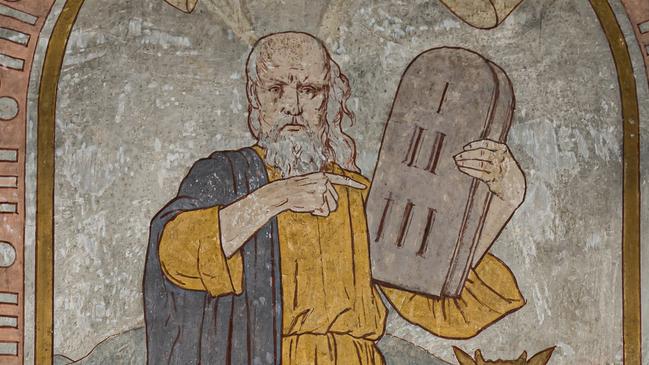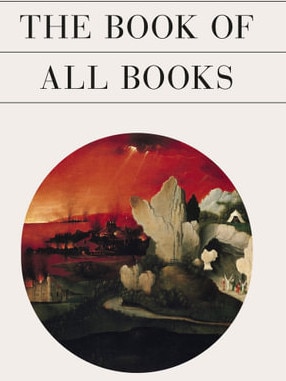Irresistible melodrama in The Book of All Books
A bold literary project to reimagine the great Bible stories has ended with a death of an extraordinary man with a remarkable mind.

The Old Testament tremendously starts with the creation and the spirit of God moving over the face of the waters. It depicts Abraham asked to sacrifice his son Isaac, Jacob wrestling with the Angel, Joseph sold into an Egypt he comes to govern and then the Jews becoming the Egyptian’s slaves until Moses demands deliverance and the Red Sea parts and the tables of the Law are handed down. There are the thundering stories of the kings: Saul who tries to kill David, Jonathan who loves him, both slain. The wise guy Solomon and then the prophets, the greatest of whom, Isaiah, seems to look forward to Jesus. There is the introspection of the Psalms, the near tragedy of Job, the eroticism of the Song of Songs, and the cool sombre scepticism of Ecclesiastes.
Only Shakespeare, as Harold Bloom says, can equal it and you can see why Roberto Calasso who anatomised Greek myth in The Marriage of Cadmus and Harmony wanted to take the culture of the Chosen people as his play thing. The Book of All Books is a brilliant and self-indulgent work by someone who was not quite a critic and not quite a writer but some bizarre amalgam (Calasso, who was also a publisher and polymath, died in Italy, aged 80, last July.)
The most straightforward section of The Book of All Books is the discussion of Freud’s depiction of the great lawgiver in Moses and Monotheism in which he identified him with the Egyptian pharaoh Aknaten and said that he had actually been cannibalistically consumed by the Jewish people. Calasso is brilliant and surefooted and delineates Freud’s Jew as the quintessential outsider, even the secular Jew who is more German than anyone but who still identifies with his Jewishness, through the assiduousness with which he pursues the gentile path. The insignia of his Jewishness is the way he outdoes himself.
Calasso is a master, outshining an all but unknowable original. “David’s ‘last words’ were a song that ended with a description of something he hadn’t been: a just king … His attention was keen, fluid, constant … His foot slipped and he fell, banging the back of his head on a stair. This lifeless body lay in the sunshine because it was the Sabbath and no one could touch him. But some four angels glided around him to shade him with their wings, as if beneath a black tent.”
He starts with the extraordinary strangeness of the Jewish conception of beginnings.
“Nine hundred and seventy four generations before the world was created the Torah was written. How? With black fire on white fire.”
Much of the implicit burden of Calasso’s weirdly analytical retelling of this story is concerned with blood sacrifice. His narrative reeks of blood and murder and he also emphasises that Yahweh’s struggle in Egypt showed a competitive god among other gods. Sometimes –weirdly and fleetingly – we glimpse a world that was only starting to configure itself as the Judaism we know.

Calasso abhors blood sacrifice and finds its melodrama irresistible just as he abhors the fact that the world “holocaust” which he repeats endlessly should have been appropriated so that “the systematic extermination of one people by another has to be given the name of a religious ceremony … of the exterminated people”. He sees this as “an atrocity”. Abraham is given only an unearned grace, Job an undeserved “dis-grace”.
And throughout this luminous bewilderment of a book – brilliantly translated by Tim Parks – the Hebrew Bible is presented through more or less flat scholarly crit translations of The Pleiade or Robert Alter variety. This defamiliarises everything and flattens it at the same time.
When David weeps for Absalom he says, “why didn’t I die in your place?” rather than “would God I had died for thee” and earlier when he weeps for Jonathan he says his love was “more so than the love of women” rather than “passing the love of women”.
Calasso is weirdly devoted to the Vulgate even though its translator Saint Jerome enunciated the first principle of translation: word by word in the mysteries but meaning by meaning elsewhere. So Calasso’s crib has the preacher Ecclesiastes say that what he’s about is “an evil occupation” where the King James has “sore travail” and the Revised Standard Version has “an unhappy business”.
Calasso adores the Song of Songs – “drenched in erotic excitement”– and Ecclesiastes which he says “declares the futility of all success” and tells the story of the Sanhedrin debate that had one side accusing them of being “dirty” before they were let into the canon.
He says the Song of Songs is associated with Solomon because of his depth of human understanding not just bowing to godly authority.
These two books were taken up by The Bible As Literatureeditors who printed the Revised versions as superior to the Authorized and which were recorded by James Mason and Claire Bloom. Calasso’s epigraph from Goethe suggests that “the book of all books” allows us “to enter there as into a second world” where we can “enlighten” and “perfect ourselves”.
Calasso loves the breath of life in these renegade books of the Bible and reconstitutes the God-daunted bits. He does handstands around the Book of Wisdom to depict Solomon’s wooing of that Lady as erotically charged and the old translations bear him out. “Yea, rather being good, I came into her undefiled.”
Peter Craven is a cultural critic.
The Book of All Books



To join the conversation, please log in. Don't have an account? Register
Join the conversation, you are commenting as Logout